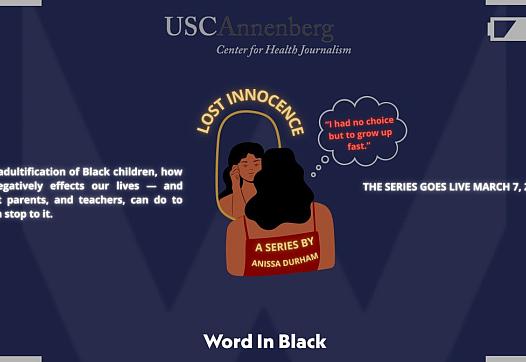Black Children Deserve to Be Children
The story was originally published in Word in Black with support from the USC Annenberg Center for Health Journalism’s 2022 Data Fellowship.
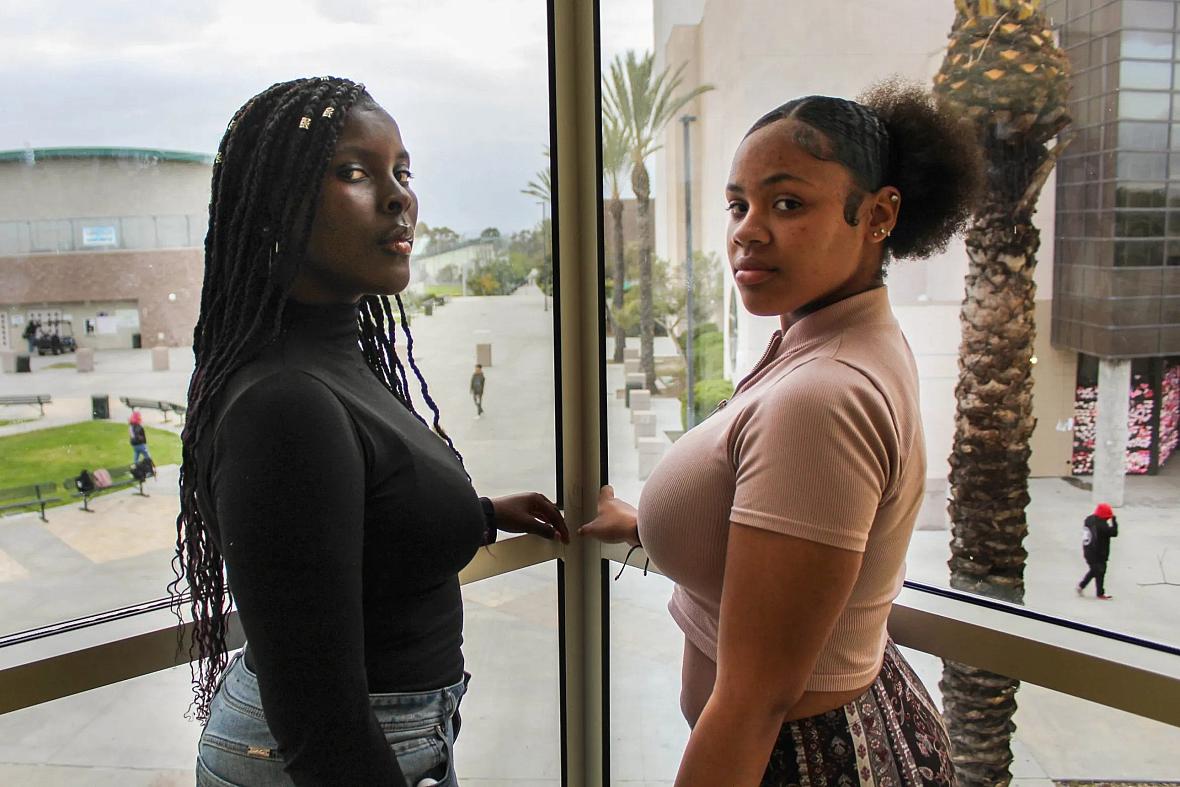
Chrishana Bunting, 16, and Lizette Pierce, 16, pose for a photo inside the Lincoln High School library in San Diego on Feb. 13, 2023. Both friends have experienced sexual comments about their bodies, treated like adults throughout their childhood, and received inappropriate comments about their skin tone. All examples of adultification bias and anti-Blackness.
(Anissa Durham/ Word In Black)
We were all children once. But there’s being a child, and then there’s being a Black child — which is a completely different experience.
But what is it about Black childhood that sets this experience apart?
“When people see Black children, if they don’t see them as people, they definitely don’t see them as children,” says Amir Gilmore, assistant professor of cultural studies and social thought in education at Washington State University.
The presence of Black children threatens non-Black people. Black girls are called “fast.” Black boys are seen as men. Our bodies are constantly told to act this way or the other. When we resist these perceptions, we are labeled difficult. Treated with severe punishment. Disciplined as a form of correction.
The treatment and imposed expectation of how Black children should act is a loss of their innocence. Something every child should have, yet Black children aren’t given the luxury of. Decades ago, there was no language to describe this treatment. Today, there is.
It’s called adultification bias. It is a stereotype based on the ways in which adults perceive children and their childlike behavior.
The appearance of how Black boys show up in space — it’s always something that’s really wrong, or destructive, inappropriate.
Adults who impose this stereotype on Black children treat them like they do not deserve to play and need less nurturing, protection, support, and comfort.
This bias presents itself in households, educational settings, and society. Black children are expected to act like adults before reaching adulthood by the adults they interact with, like family members, teachers, and police officers.
Why does this matter?
Because whether you realize it or not, most Black people have experienced adultification. And, there are ways to break this cycle and allow Black children to be just that — children.
The History and Impact of Adultification Bias
Gilmore says adultification bias is rooted in anti-Black racism that goes back to chattel slavery. Enslaved Black children were used for their labor, often working in the field with no recreation or means of being educated.
In Gilmore’s 2021 study, Antiblackness and the Adultification of Black Children in a U.S. Prison Nation, he details how anti-Blackness and adultification are intertwined. Post-slavery, Black households still had to deal with the ill effects of racism, sexualized violence, and responsibilities being passed down to the children — something that hasn’t gone away.
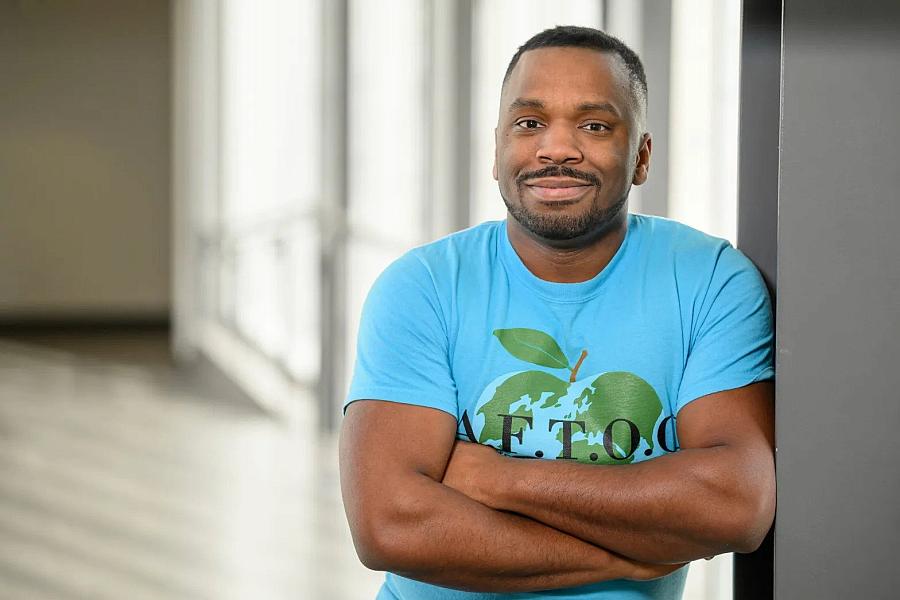
Amir Gilmore, assistant professor of cultural studies and social thought in education at Washington State University, on Feb. 2, 2023.
Photo courtesy of Gilmore.
The anti-Black structures in our society influence the way teachers treat Black children, why police racially profile Black youth, and how Black bodies are sexualized. Research shows Black children are perceived to be less innocent, which contributes to harsher punishment from adults.
“When I think about adultification for Black boys … it’s really centered around how Black bodies are perceived when they play,” Gilmore says. “The appearance of how Black boys show up in space — it’s always something that’s really wrong, or destructive, inappropriate.”
For instance, in Nov. 2014, Cleveland police shot and killed 12-year-old Tamir Rice within seconds of seeing him playing with a toy gun in a park. Their perception was he was older, should have known better, and was a threat.
But, for Black girls, the impact typically looks a little different.
Their young bodies are often sexualized with labels of being fast, curvy, or promiscuous. Some parents tell their daughters this because they heard it growing up or it’s thought to serve as a protection from unwanted and inappropriate attention.
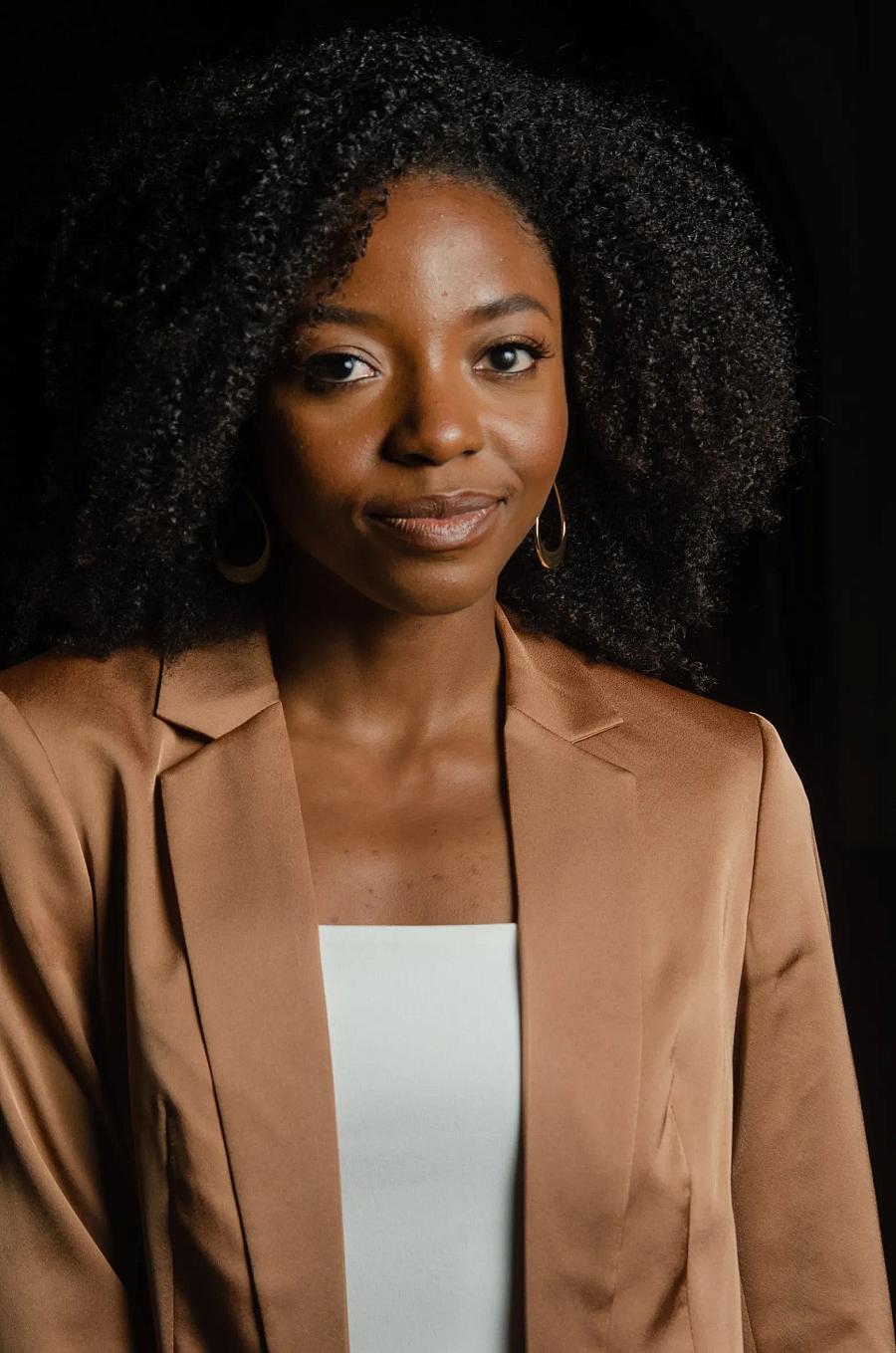
Jasmine Young, a policy analyst at the National Health Law Program.
Jasmine Young, a policy analyst at the National Health Law Program says Black families may unknowingly hypersexualize their children because of generational trauma. In particular, the history of reproductive oppression against Black girls and women didn’t allow them to have control over their bodies — like systemic rape and bearing children without consent.
“Anti-Blackness and adultification bias has a huge health impact on Black folks,” she says.
Because of that trauma, instead of shifting the attention to the adult in question, the pressure to cover up and be mindful of the inappropriate adult gaze is put on the child. The child is required to fix themselves.
“It takes a lot of healing and recognizing where those tendencies come from,” Young says. “And having a conversation and dealing with the conflict that may arise within Black families in order to prevent the continued sexualization of Black children.”
Lost Childhood, Lost Innocence
It was a chilly February Monday after school when Chrishana Bunting and Lizette Pierce walked me into the Lincoln High School library in San Diego. The two friends seemed a little nervous but excited to be interviewed.
As the apprehension distilled, we sat in the middle of the library. The two girls sat side-by-side. They wanted to know what kinds of questions would be asked, and I assured them, whatever they were willing to share was what I’d be interested in hearing. If they were not comfortable, they didn’t have to answer.
That simple.
Chrishana is 16-years-old and has two younger siblings, aged 11 and 14, who live at home with her. She says throughout her years at a predominantly Hispanic middle school, she was overdisciplined by her teachers.
Oftentimes she was the only Black student in the class. When friends would get chatty during class, she was typically singled out. If a group of students got in trouble for talking, she was the only one the teacher sent out of the classroom.
“Even then, I knew, it’s because I’m Black,” she says.
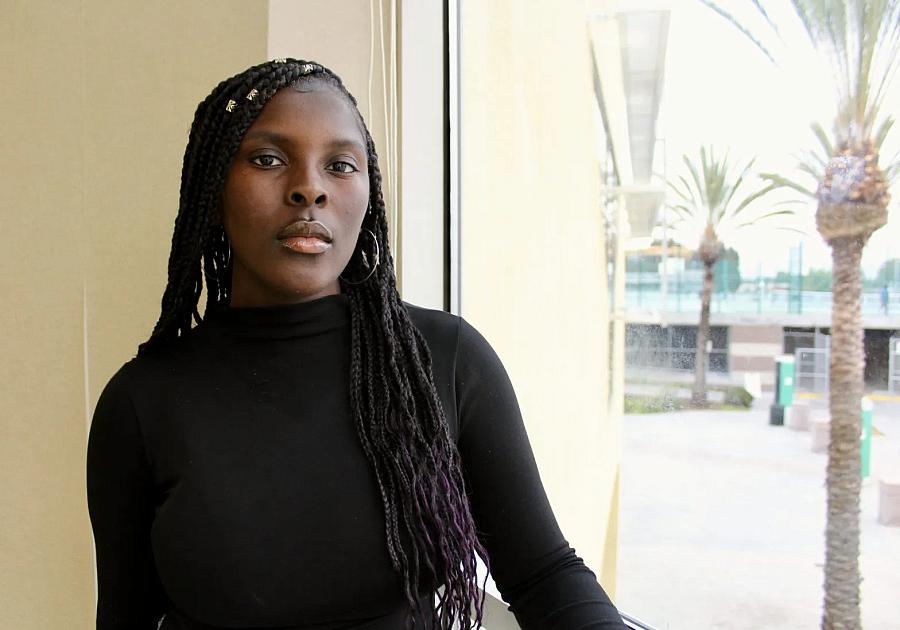
Chrishana Bunting,16, poses for a photo inside the Lincoln High School library in San Diego on Feb. 13, 2023. Throughout her pre-teen and teen years, she experienced adultification bias and anti-Blackness.
(Anissa Durham/Word In Black)
Chrishana says her parents would usually agree with the teacher.
“It’s like my side of the story never matters. Whatever I say doesn’t matter. It’s always overshadowed because they are an adult, and I’m a kid,” she says.
Now in high school, the expectation is different. Chrishana says teachers expect her to be more mature and treat her with a higher standard. But one thing hasn’t changed: “The moment we slip up, we get punished immediately,” she says about her experience and that of her Black classmates.
Data from the California Department of Education supports Chrishana’s statement. In the 2021-22 school year, African American students had the highest suspension rate.
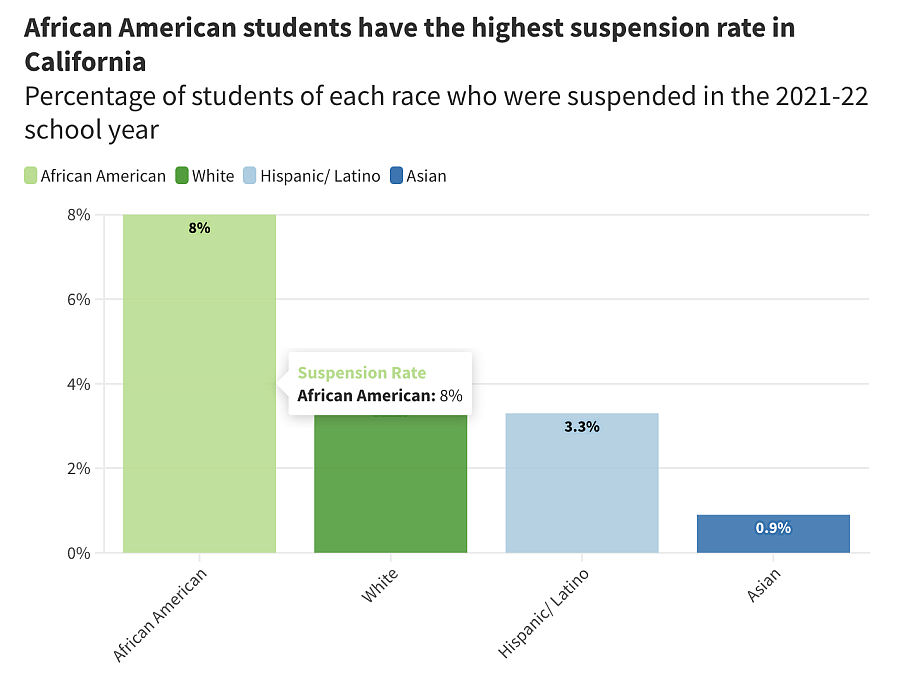
Graphic by Anissa Durham
“When I see in comparison with white peers when trouble happens to them, the notion of innocence is always played out,” Gilmore says. “Why is the benefit of the doubt never given to that Black child?”
Schools Are Sites of Suffering
It’s not enough to have other Black students or even teachers in a class. Anti-Black behavior still continues among students. Lisette, who was 15 during our interview, is now 16-years-old and says non-Black students have called her the n-word. Non-Black teachers did nothing.
“I’m a girl, so I don’t really say nothing about it,” she says. “And I’m not going to do much because I can’t control what people say.”
Other students have assumed Lizette was mixed with white, because of her lighter complexion. She isn’t. But says it’s a constant battle to prove her worth as a Black person on top of the pressures to act more mature.
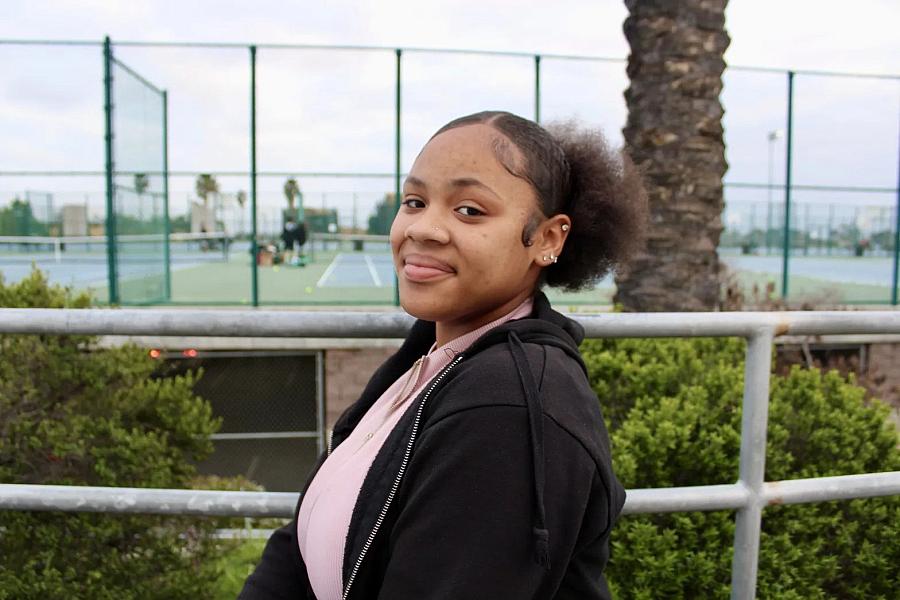
Lizette Pierce, 16, poses for a photo on the Lincoln High School campus in San Diego on Feb. 13, 2023. Throughout her pre-teen and teen years, she experienced adultification bias and anti-Blackness.
(Anissa Durham/Word In Black)
When asked what it’s like to be a Black student in San Diego, Lizette says she wouldn’t even know how to describe it. The experience of being a young Black girl is like no other.
“It’s hard to explain it, they have to live it,” she says.
During the 2021-22 school year, African American students in California had the lowest one-time suspension rates but the highest rate of multiple suspensions.
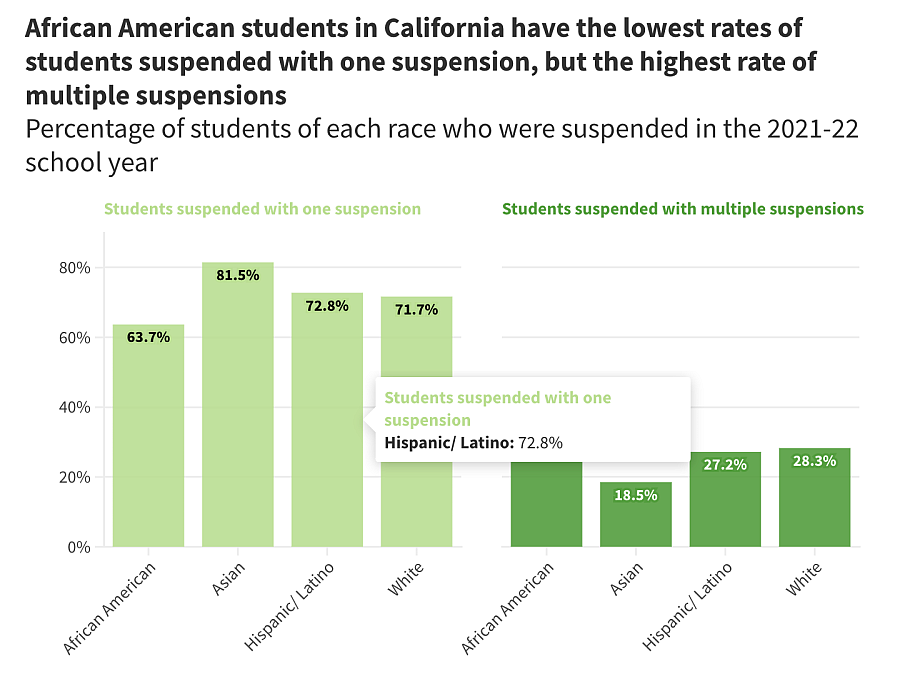
Graphic by Anissa Durham
“I believe that non-Black people can also be custodians of anti-Blackness,” Dr. DeMarcus Jenkins says, an assistant professor of education at Penn State College of Education. “A lot of that gets erased when we just think about white folks as the perpetrators of anti-Blackness.”
In his 2022 article, Feeling Black: Black Urban High School Youth and Visceral Geographies of Anti-Black Racism, which was published in the journal Equity & Excellence in Education, Jenkins explored the Black student experience in a predominately Latinx school.
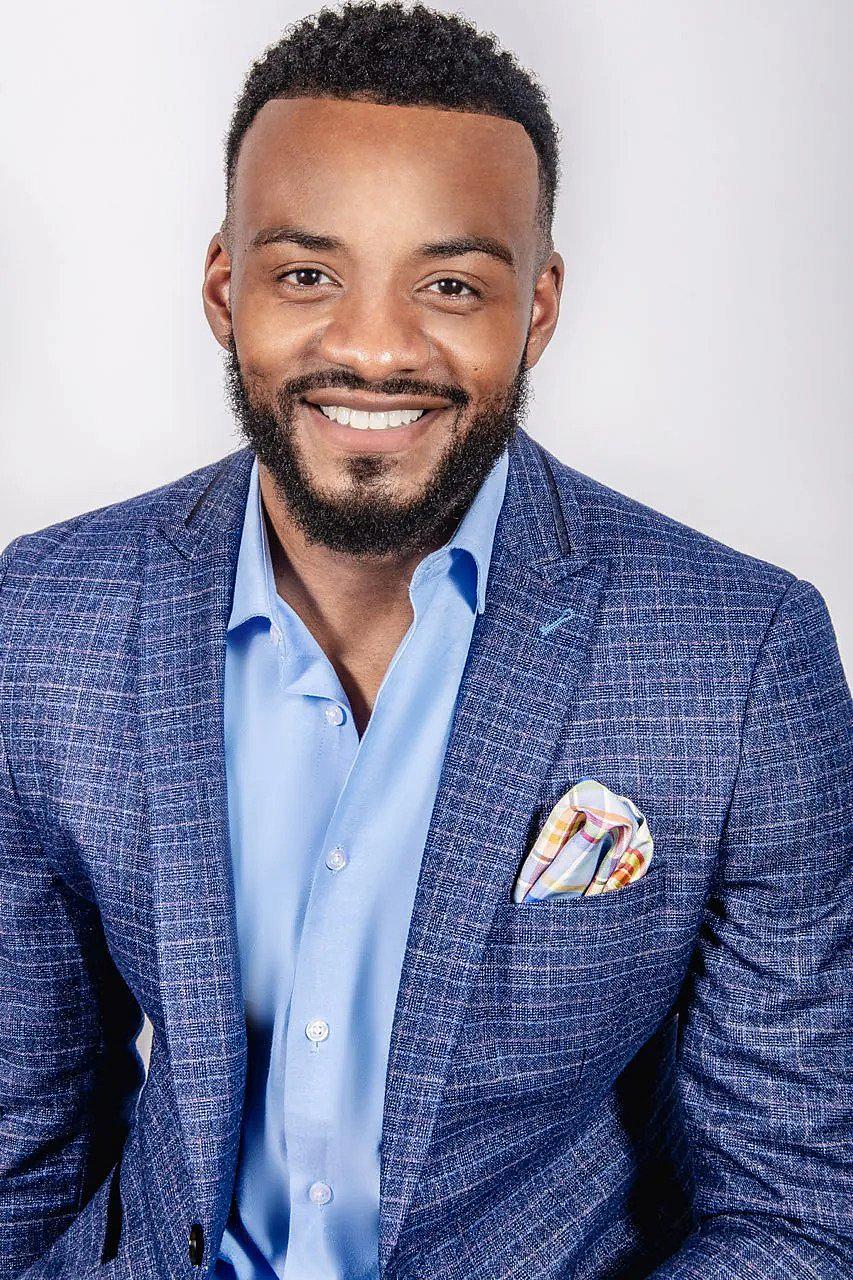
DeMarcus Jenkins, assistant professor of education at Penn State College of Education.
He references the uptick in popularity of the term BIPOC, or Black, Indigenous, and people of color — he pushes against this idea that all people of color experience oppression in the same way. Black students, Jenkins says, still have negative school experiences even when most students are non-Black people of color.
A theme throughout his research is Black students’ feelings of unbelonging. Although they are allowed space to be in school and participate in activities, students don’t always feel safe.
“When Black people speak their language, and their linguistic phrases are not welcomed or accepted — or being asked to interpret or say it differently — those are ways in which Black bodies are made to feel not welcomed or uncomfortable in spaces,” he says. “Which I think contributes to anti-Black violence.”
There is also an idea of unimaginability about Black students, Jenkins says. It is unimaginable for Black students to be in school, receive scholarships, to excel in education. That belief is harmful to the success of Black students.
That’s a sentiment Lizette shares.
“We have to work 10 times harder than non-Black students,” she says.
Some of Lizette’s teachers have claimed Black people don’t have as much education as non-Black students. And if Black youth are not participating in sports, they will not get accepted into college.
Some Black students are restricted in their agency or control of how they learn, Jenkins says. Their desires are not always nurtured in the same way non-Black students are. And this overlap of infantilizing Black children, treating them as younger than they are in their learning but adultifying their behavior intersects.
“Black youth become so accustomed and, in some ways, normalize the surveillance of their bodies,” Jenkins says. “We are conditioned or trained to limit our expression, to monitor what we do with our bodies, to shrink. Because if we’re too big, if we’re too loud, if we are too outspoken, if we stand out too much, this can come with detrimental and sometimes fatal consequences.”
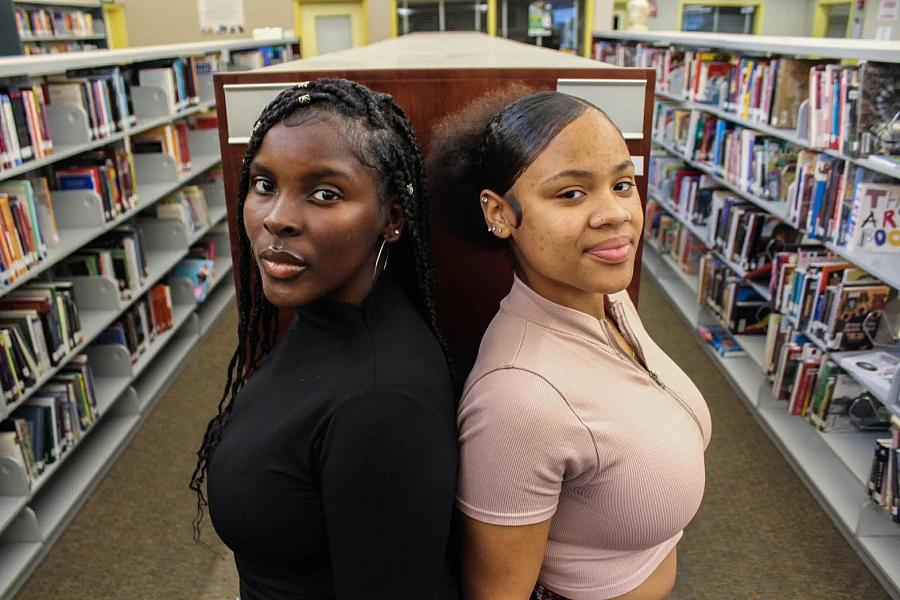
Chrishana Bunting, 16, left, and Lizette Pierce, 16, pose for a photo inside the Lincoln High School library in San Diego on Feb. 13, 2023.
(Anissa Durham/Word In Black)
One of the primary sites Black youths learn these messages is in school. Jenkins says “schools are sites of suffering.” The impact anti-Black racism and violence have on students results in Black youth feeling out of place, isolated, and anxious.
Impact of Adultification Bias
Chrishana says when she thinks about her transition from elementary to middle school, she feels like there was less grace allowed for her to make mistakes. Now as a high school sophomore, the pressure to be perfect is constant. And now it also stems from within.
“I always feel this constant need to be ahead,” she says. “I’m my biggest enemy. I’m my biggest hater. I put all this pressure on myself.”
As a result, Chrishana sometimes deals with anxiety. Recently she hasn’t felt like going to school. With little family support, she says it’s been a struggle to balance the weight of it all.
On top of that, Chrishana and Lizette both said they have experienced adult males sexualizing them while riding the bus home from school. Questions about their age. Comments about their bodies. Catcalls while walking to and from the store.
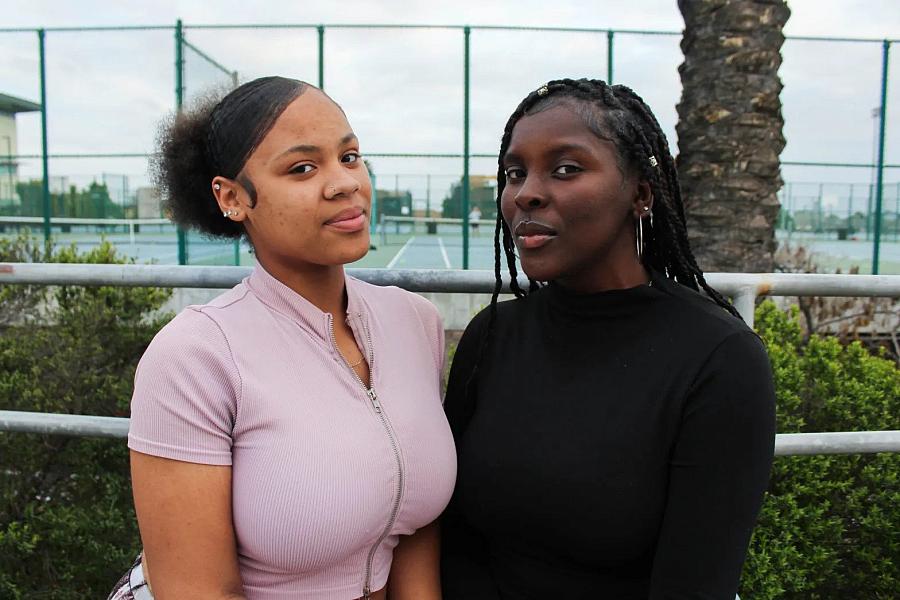
Chrishana Bunting, 16, left, and Lizette Pierce, 16, pose for a photo inside the Lincoln High School library in San Diego on Feb. 13, 2023.
(Anissa Durham/Word In Black)
The persistent hypersexualization of their bodies started as young as 12. It has made them feel insecure and uneasy about their bodies. As a result, both girls say they stopped seeing themselves as girls between the ages of 13 to 14. They consider themselves young women in part because of the labels adults have attached to them.
Despite the challenges that have come with being adultified and sexualized, both friends said school is their top priority. And they hope things will get better in college.
“I always put school first. I’m never gonna let my grades slip because I’m depressed or something,” Chrishana says. “I just have to push my feelings aside and just thug it out.”
Did you like this story? Your support means a lot! Your tax-deductible donation will advance our mission of supporting journalism as a catalyst for change.

